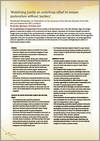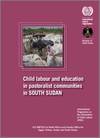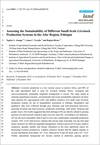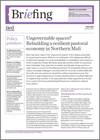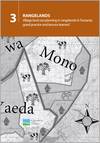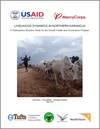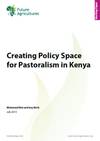The representatives of the governments of the six countries of the Sahel (Burkina Faso, Chad, Mali, Mauritania, Niger, and Senegal) gathered in Nouakchott by invitation of the Government of the Islamic Republic of Mauritania, the Permanent Interstate Committee for Drought Control in the Sahel (CILSS), and the World Bank in collaboration with the African Union Commission, the Economic Community of West African States (ECOWAS), the West African Economic and Monetary Union (WAEMU), and the United Nations Food and Agriculture Organization (FAO) and in the presence of representatives of international and regional research organizations, civil society organizations, producers' organizations, the private sector, and technical and financial partners, for the purpose of strengthening the resilience of Sahelo-Saharan pastoral societies.
Year of publication: 2013Organization: كتاب مستقلون
Topic: مشاركة
Language: English
Type of document: السياسات والتشريعات
Geographical coverage: غربية افريقيا, أفريقيا الوسطى
This study gives an in–depth understanding of child labour in selected pastoralist communities in South Sudan. This information can be used to formulate and/or revise public policies and programmes on education and child labour elimination.
Year of publication: 2013Organization: منظمة العمل الدولية
Topic: بين الجنسين والشباب
Language: English
Type of document: تقني
Geographical coverage: شرق أفريقيا
Livestock production is a key income source in eastern Africa, and 80% of the total agricultural land is used for livestock herding. Hence, ecological and socio-economically sustainable rangeland management is crucial. This study aimed at selecting operational economic, environmental and social sustainability indicators for three main pastoral (P), agro-pastoral (AP), and landless intensive (LI) small-scale livestock production systems for use in sustainability assessment in Ethiopia. The study concluded that sustainability indicators are valuable tools to highlight shortcomings and strengths of the three main livestock production systems and help with future livestock management in Ethiopia. Selecting suitable indicators, however, is crucial as data requirements and availability can vary across livestock systems
Year of publication: 2013Organization: كتاب مستقلون
Topic: أمن غذائي, مرونة
Language: English
Type of document: تقني
Geographical coverage: شرق أفريقيا
Much has been made of the ‘ungoverned spaces’ of the Sahara, impossible for government to police. While it is true that parts of the Sahara are difficult to patrol and manage, it is not all uninhabitable or uninhabited: some areas are home to pastoral nomads. But these areas also provide shelter for a growing band of jihadists. They share the mountains and Sahelian fringes and are a major cause of concern for the Mali government. To limit jihadist influence will require immediate strategies: concerted effort to reconcile southern Mali with the north, and new policies to rebuild the northern pastoral economy. This should be a regional approach, to include rebuilding links to southern Mali and to neighbouring countries. A stronger pastoral society, supported by a border force could control the potential jihadist threat and contribute to national reconciliation.
Year of publication: 2013Organization: المعهد الدولى للبيئة والتنمية
Topic: صراع, نوع الملكية
Language: English
Type of document: تقني, السياسات والتشريعات
Geographical coverage: غربية افريقيا
Pastoralists require movement across village boundaries to access or share grazing or water resources. They may classify and use land in ways that do not fit easily with government definitions or processes. Grazing is often patchily distributed, and large areas of rangeland with flexible use are required. Pastoralism is an integrated and multiple-use land use systems, which rely upon collective use and management of natural resources by customary institutions. This makes village land use planning (VLUP) processes in rangelands contexts quite challenging.
This document, developed by the Sustainable Rangeland Management Project (SRMP), seeks to suggest improvements to the VLUP process in order to better contribute to sustainable rangeland management. It brings together experience from different organisations and government departments working on VLUP in rangelands areas of Tanzania, as well as relevant lessons from other contexts.
Year of publication: 2013Organization: الائتلاف الدولي للأراضي
Topic: الإدراك الفطري, الشعوب الأصلية, نوع الملكية, منظمة, مشاركة
Language: English
Type of document: تقني
Geographical coverage: شرق أفريقيا
This report documents the findings of a livelihoods assessment carried out as part of the USAID funded Growth, Health and Governance program being implemented by Mercy Corps and partners in the Karamoja sub-region of Northeastern Uganda. The study set out to identify the major opportunities and constraints to production and marketing in the study area and to investigate what productive resources are currently available and how these are being utilized. The study included focus group discussions, participatory exercises, a number of visits to market centers as well as key informant interviews.
Year of publication: 2013Organization: , الوكالة الأمريكية للتنمية الدولية
Topic: اقتصاد
Language: English
Type of document: تقني
Geographical coverage: شرق أفريقيا
At its meeting of 26 November 2012, the Bureau of the ACP-EU Joint Parliamentary Assembly authorised its Committee on Social Affairs and the Environment to draw up a report, pursuant to Article 2(8) of its Rules of Procedure, on the social and environmental impact of pastoralism in ACP countries.
Year of publication: 2013Organization: الاتحاد الأوروبي
Topic: الخدمات البيئية, منظمة
Language: English
Type of document: تقني, السياسات والتشريعات
Geographical coverage: أمريكا اللاتينية, غربية افريقيا, أفريقيا الوسطى, شرق أفريقيا, جنوب أفريقيا, أوسيانيا
This paper reflects on the work of the Ministry of State for Development of Northern Kenya and other Arid Lands between its formation in April 2008 and the elections of March 2013. The paper begins by summarising the historical, political and institutional contexts within which the Ministry was created, as well as the multiple narratives that have driven policy in Kenya’s drylands over time. It explains some of the policy choices the Ministry made in interpreting its mandate and shaping the policy agenda. The paper reflects on the response of different actors to the policy space opened up by the establishment of the Ministry, and looks at how it implemented its mandate and its day-to-day engagement with others. The authors discuss the institutional framework in more detail and the steps required to strengthen it further. The paper concludes with reflections and recommendations.
Year of publication: 2013Organization:
Topic: اقتصاد, الخدمات البيئية, أمن غذائي, منظمة, مرونة
Language: English
Type of document: علمي
Geographical coverage: شرق أفريقيا


